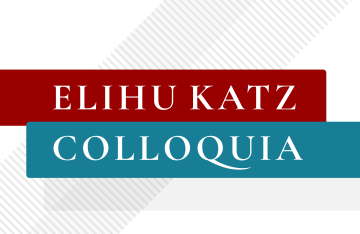
Elihu Katz Colloquium: Christopher Ali (Ph.D. '13), Penn State
- Annenberg School for Communication (Room 500)
“What is your broadband story?”: Epistemics and empathy in telecommunications policy.
About the Talk
The COVID-19 pandemic propelled broadband into the front of mind for policymakers. During these years we learned that within this country, tens of millions were without access to connectivity, and even more could not afford existing connectivity options and even more lack the skills to thrive in a COVID-mandated digital world. This move online throughout times of social distancing in turn exposed many deep failures of policies and programs designed to correct the many “digital divides” that have permeated over the last decade. Specifically, the COVID-19 pandemic exposed a political economy that privileged providers over communities, and profits over people, leading to what scholars have called “digital inequality” and “digital distress” for tens of millions across the country.
We have certain normative expectations within a democracy of how our regulatory agencies should operate and who they are to serve. Beyond the basic guiding principles expected within a democracy of serving the public it means to represent, in telecommunications policy every decision must be made in “the public interest, convenience and necessity” as defined in the 1934 Communications Act – further solidifying the public as sacrosanct. In practice, however, the public has been erased entirely in telecommunications policy – both as the recipient of policy decisions and as a stakeholder in policy decision making.
To align the political economy of broadband policy with these normative democratic objectives, two truths need to be acknowledged. First, policies impact people’s everyday lives (for better or worse) and we need to better understand this top-down relationship – I call this lived policy. Second, for policy to positively impact everyday life (such as for instance, deployment broadband to rural, remote and Tribal areas), policy making must to be responsive to people’s everyday experiences. One way to achieve this dialogue is through the telling and receiving of stories from of everyday experiences, and in turn acknowledging that broadband communities - individuals who shared knowledge of, and experience with, telecommunications companies and products - are epistemic communities. Incorporating both – the top down of policy impact and the bottom up of stories - opens opportunities for policies based on empathy and centered on people, not profits or politics.
Based on qualitative research rooted in feminist political economy and the political economy of everyday life, this presentation introduces the lifecycle of empathic policy as a conceptual apparatus to inform more democratic and public serving policy making. I do this through exploring examples of lived policy implications and subsequent empathy-based understandings, all gained through the experiences of people and communities across the country.
About the Speaker

Dr. Christopher Ali is the Pioneers Chair in Telecommunications and Professor of Telecommunications in the Bellisario College of Communications at Penn State University. He uses critical qualitative methodologies to research broadband policy, planning, deployment and digital equity in the United States. Presently, he has a series of projects dedicated to “broadband stories,” where he is researching how community-based stories can influence public policy. Dr. Ali is the author or editor of four books: Public Service Media’s Contribution to Society (2023, with Prof. Dr. Manuel Puppis), Farm Fresh Broadband: The Politics of Rural Connectivity (2021), Media Localism: The Policies of Place (2017), Echoes of Gabriel Tarde: What we know better or different 100 years later (2014, with Drs. Elihu Katz and Joohan Kim). Based on his expertise, Dr. Ali was called to testify before the Senate Commerce Committee in 2021 on broadband funding and policy programs. He also previously served as a subject matter expert to the FCC’s Communications Equity and Diversity Council. In addition to authoring over two dozen journal articles and book chapters, his writing has been published in The New York Times, The Hill, Realtor Magazine, Law & Political Economy, Digital Beat, GovTech, Zocalo Public Square, The Canadian Broadcasting Corporation, Washington Monthly, Columbia Journalism Review, and The Conversation.
Events
View AllDisclaimer: This event may be photographed and/or video recorded for archival, educational, and related promotional purposes. We also may share these video recordings through Annenberg's website or related platforms. Certain events may also be livestreamed. By attending or participating in this event, you are giving your consent to be photographed and/or video recorded and you are waiving any and all claims regarding the use of your image by the Annenberg School for Communication. The Annenberg School for Communication, at its discretion, may provide a copy of the photos/footage upon written request.
